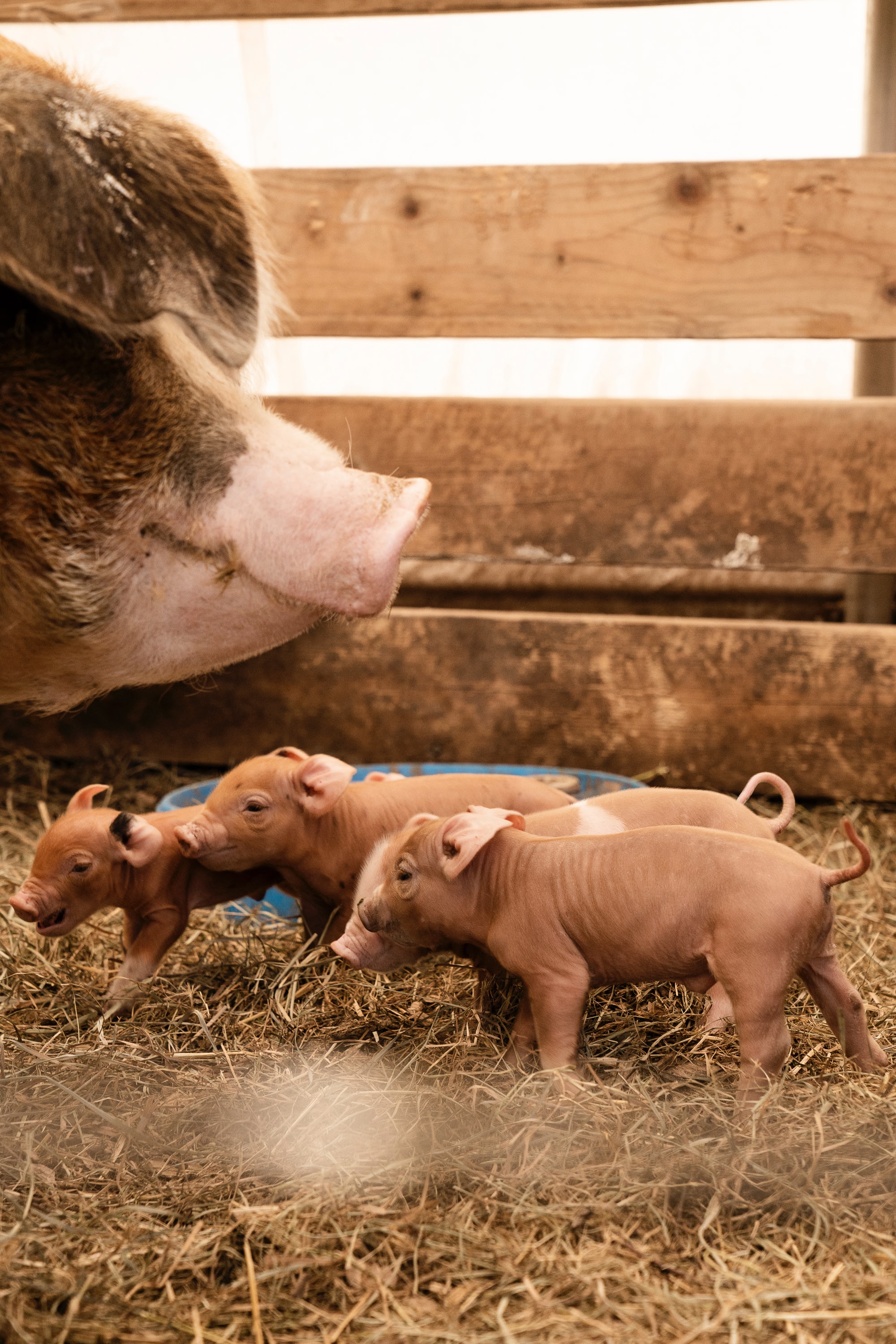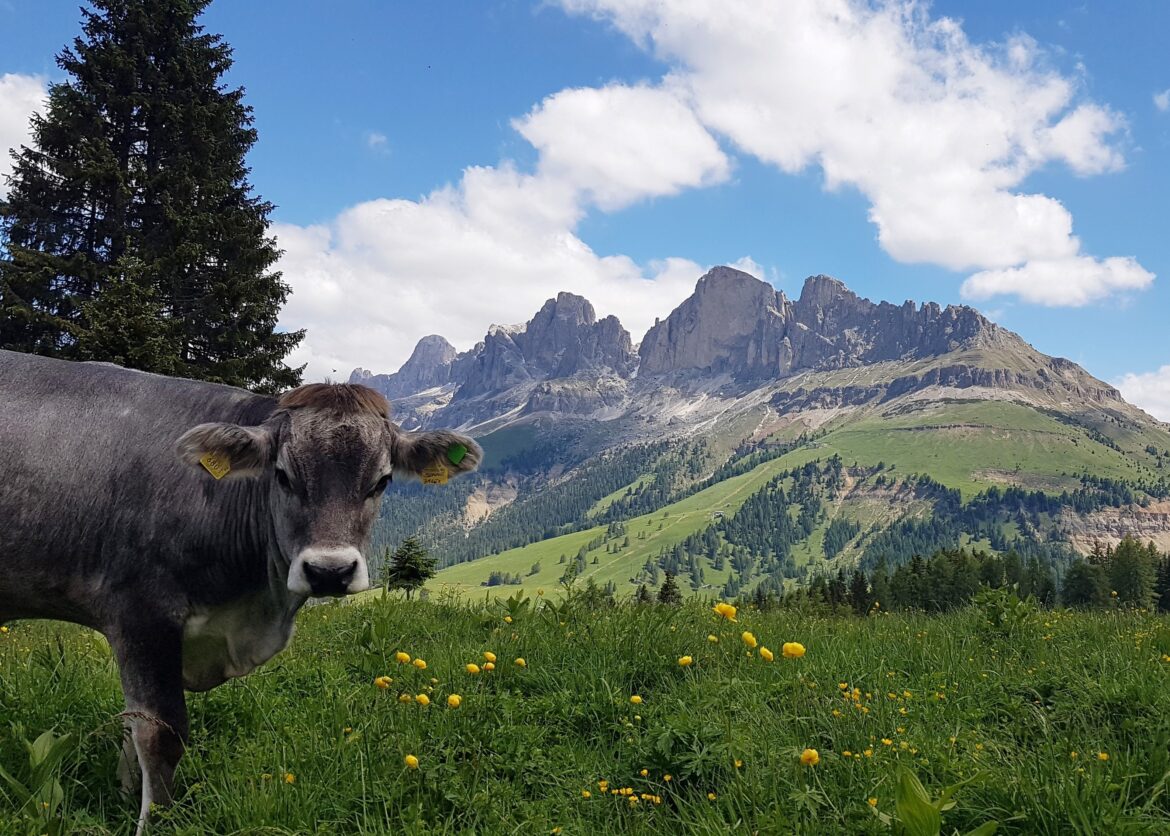Matthew C. Halteman, Professor of Philosophy at Calvin University in Grand Rapids, Michigan, reflects upon God’s abundant love for creation and how veganism can offer an opportunity to model the Judeo-Christian vision of shalom.
In exploring the Judeo-Christian vision of creation in light of the common home this narrative envisions for human beings and our fellow creatures, I find it exciting that the breadth and beauty of this vision has the potential to transcend our limited perspectives and reveal some shared commitments of the faith. Whether fellow Christians understand the Bible as offering a literal account of how God created the world or a divinely-inspired story that makes the mysteries of theistic evolution more accessible, paying careful attention to the text reveals many aspects of the narrative on which we can all perhaps agree.
 God created the world out of abundant love. Human beings and our fellow creatures are shaped in the divine mind from a common creative inspiration and endowed with the breath of life through the common gift of nepesh (נפש). We derive our creaturely dignity and inherent goodness from God’s sustaining love, invited into fellowship with one another as an all-species kinship. Human beings are dignified with a special calling—not to be domineering lords and masters of other creatures, but rather to serve as their benevolent caretakers and companions, made in the image of God’s love and loyalty for the high duty of nourishing the goodness, truth, and beauty of everything God made. Everyone with the breath of life was envisioned to eat a plant-based diet in a shared garden paradise where scarcity, predation, pain, and death found no shelter.
God created the world out of abundant love. Human beings and our fellow creatures are shaped in the divine mind from a common creative inspiration and endowed with the breath of life through the common gift of nepesh (נפש). We derive our creaturely dignity and inherent goodness from God’s sustaining love, invited into fellowship with one another as an all-species kinship. Human beings are dignified with a special calling—not to be domineering lords and masters of other creatures, but rather to serve as their benevolent caretakers and companions, made in the image of God’s love and loyalty for the high duty of nourishing the goodness, truth, and beauty of everything God made. Everyone with the breath of life was envisioned to eat a plant-based diet in a shared garden paradise where scarcity, predation, pain, and death found no shelter.
The realities of our fallen earthly home are comparatively sobering. But reflecting on this scriptural vision of a fully shalom-filled creation—peaceful, just, joy-worthy, and much-beloved of God—has nonetheless intensified my delight in, curiosity about, and understanding of God’s world. I have been encouraged to find throughout this learning process that the discoveries of general revelation—what we learn about God and creation through common sense and careful study of the world around us—is deeply resonant with the holistic vision of creational flourishing that scripture invites us to imagine and that Jesus himself enjoins us to enact, setting our sights on perfection as God in heaven is perfect.
The world is a whole of interconnected parts that flourish when they’re in balance and languish when they’re not. Creatures of God, whether human beings or members of other species, do share the breath of life and many other attending capacities, including intelligence, emotion, and social engagement in a dignified, worthy existence. Our collective wellbeing does depend to a significant extent on human leadership and decision-making. Acts and institutions that multiply love, caring, and service can and do make a world of difference to individuals and communities who experience them (across all species), while acts and institutions that multiply selfishness, indifference, and cruelty can and do diminish and destroy creaturely dignity.
So special and general revelation—the illuminations of scripture and the study of God’s world respectively—seem to be of a piece. Notwithstanding our fallenness, the standard toward which Jesus calls us to strive and with which St. Paul seeks to revive us again is the perfection of a fully shalom-filled creaturely life and world in which the fruit of the spirit grow in abundance: love, joy, peace, patience, kindness, goodness, faithfulness and self-control. The central question of Christian ethics, then, is that of how best—under inexorably fallen circumstances—to live a life that is deeply nourished by this creational vision of shalom and that hopes for and seeks to approximate that vision with as much love and loyalty as one imperfectly can.
 In my own humble strivings to live such a life, practicing the spiritual discipline of aspirational Christian veganism has proved an inspiring, holistic, and delightful way to live toward the creational ideal without the illusion that purity or perfection is possible. I understand aspirational Christian veganism not as an identity that one can achieve, but rather as an ongoing task to which one daily aspires—an intentional daily practice of striving in my attitudes and actions to model love for and loyalty to God and the flourishing of everything God made.
In my own humble strivings to live such a life, practicing the spiritual discipline of aspirational Christian veganism has proved an inspiring, holistic, and delightful way to live toward the creational ideal without the illusion that purity or perfection is possible. I understand aspirational Christian veganism not as an identity that one can achieve, but rather as an ongoing task to which one daily aspires—an intentional daily practice of striving in my attitudes and actions to model love for and loyalty to God and the flourishing of everything God made.
This way of vegan living is both deeply resonant symbolically with the Judeo-Christian vision of shalom detailed in scripture, and also an excellent fit practically with what general revelation teaches about how vastly out of alignment our animal-product-heavy food system is with the creational ideal. But what, you might be wondering, does this task look like on the ground? Here are some of the concrete ways that—in my experience, anyway—practicing aspirational veganism could help you to model love for and loyalty to God’s ideal for creation:
- This practice could enable discovery of a richer, more inspiring vision of the spiritual traditions, sacred texts, and moral principles that orient your imagination and motivate you to be the change you want to see in the world.
- It could improve your physical health and ramp up your energy.
- It could expand your consciousness of the flourishing of the world at large and illuminate your small but important part in this grand cosmic dance.
- It could help you to preserve the beauty and diversity of creation and do your part to stabilize the climate of our shared planet.
- It could align your respect for the findings of science with your personal ethics and the daily attitudes and actions you take at work, at home, and as a consumer.
- It could extend the caring, respect, and empathy that you delight in sharing with beloved companion animals to all creatures deserving of that delight.
- It could demonstrate solidarity with food system workers by creating demand for products that do not require the dangerous and psychologically-debilitating labor of repeatedly hurting and killing other living creatures.
- It could illuminate the liberating truth that all forms of oppression are intertwined and that efforts to drive out the scourges of sexism, racism, ableism, and other ills can be powerfully supplemented and even focused and enhanced by opposing the exploitation of non-human animals at the same time.
- It could envelop you in the empowering spirit of resolve that animates belonging to a morally visionary community committed to provoking cultural awakening and transformation at a time of moral and spiritual crisis.
- It could set before you an abundance of global cuisines that are beautiful, diverse, nutrient-dense, protective of health, affordable, and delicious beyond belief.
This imagination-expanding vision of the world is what a Christian vegan strives to live toward, albeit imperfectly—in fits and starts and never completely or consistently—but resolutely with determination and delight. Now is a wonderful and pivotal time to take up this practice, too, as creation requires our aid more desperately than ever! But outside of that urgent necessity to meet the challenges of a suffering world on fire, there is deep goodness, truth, and beauty in living this way, come what may. No matter the hardships of the past or future, living in love of peace, justice, and hope for the flourishing of all creation is ever and always its own precious reward in an elevated and mindful present.
Matthew C. Halteman is Professor of Philosophy at Calvin University in Grand Rapids, Michigan and Fellow of the Oxford Centre for Animals Ethics, UK. For more information on Matthew C. Halteman.




